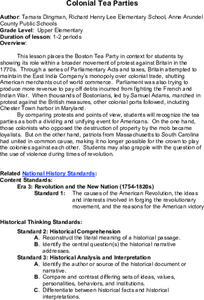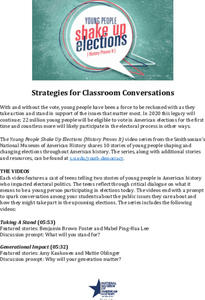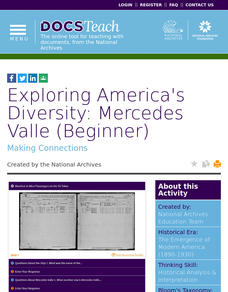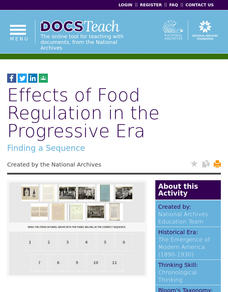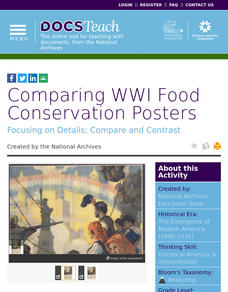Center for History Education
Democratic Ideas of the 1776 Maryland Constitution
1776 was a year of political upheaval in the American colonies. Academics examine the Maryland Constitution to understand the desire to break with Great Britain. Young historians learn about Maryland's efforts to extend rights to its...
Center for History Education
The Non-Importation Movement
Boycott for free trade! An eye-opening lesson explores the non-importation movement created by American colonists in response to the Stamp and Sugar Acts. Scholars specifically look at the impact the boycott had on colonial women who had...
Center for History Education
Was the Stamp Act Fair?
Pledge your loyalty to the king and the Stamp Act or sign an oath against the tax. After simulating an in-class tax for school supplies, young historians consider the reasons for the Stamp Act and similar colonial policies. The...
Center for History Education
Who Burned the Peggy Stewart?
Not all Patriots were on the same page against the British before the Revolutionary War. While some wanted to use peaceful means, such as debate and petition, others used violence, such as burning ships carrying British tea. Using...
Center for History Education
Runaway Slaves: From the Revolution to the New Republic
Who were the enslaved people in colonial America? Using ads from enslavers looking to recapture escaped people, young historians put faces and identities to them. Primary sources, such as wanted ads, help scholars reconstruct who these...
Center for History Education
Colonial Tea Parties
Most people know of the Boston Tea Party, but it was only one of similar protests throughout the colonies. Using a case study from Maryland, learners explore primary sources, including images and newspaper accounts of similar tea...
Center for History Education
Pontiac's War
Invaders are coming: fight them off or run? Native American peoples had to decide this question after British colonists went west following the French and Indian War. Using a speech from Chief Pontiac, young historians consider if they...
Center for History Education
Native American Gender Roles in Maryland
Toss gender roles out the window—some societies lived in a world where women not only possessed the family wealth but also were the farmers and butchers. Many Native American societies had more gender equity than European societies....
Idaho Coalition
The Hunger Games: Gender Empowerment
The odds are in your favor that your pupils will love this lesson that uses The Hunger Games to launch a study of gender empowerment, as well as the influence of social constructs of gender. Groups discuss how Katniss Everdeen and Peeta...
DocsTeach
Bibb Mill No 1 Child Labor Photograph Discussion
There's no way a child can operate heavy machinery ... right? Pupils examine a photograph of a child operating a loom at mill to learn about child labor and its impacts. Prompts provoke thoughtful discussion or fuel a writing exercise.
DocsTeach
Americans on the Homefront Helped Win World War I
Saving sugar, growing crops, and not eating meat sound like small things, but they were a huge part of the home front effort during World War I. Photographic evidence of civilian struggles during the war, along with a matching game,...
Smithsonian Institution
Young People Shake Up Elections (History Proves It) Educator Guide
Vote, it's your civic duty! The resource provides several videos about voting in the United States. Scholars watch a series of topics ranging from youth participation to civic action. The educator's guide provides teachers with...
DocsTeach
Inevitable Accident or Wrongful Act: Judging the Titanic Disaster
The unsinkable ship that sunk. Scholars review the case against the White Star Line following the tragic loss of life from the Titanic disaster. Academics read documents and organize them into arguments for and against the cruise line....
DocsTeach
Exploring America's Diversity: Rosalia Fundaro (Beginner)
Elementary scholars learn about the life of Rosalia Fundaro, an Italian immigrant, using primary sources. They analyze documents, complete written prompts, and participate in group discussion to understand Rosalia's life in the United...
DocsTeach
Exploring America's Diversity: Motel Garber (Beginner)
Young detectives delve into the past in an exciting series exploring immigration. The activity uses primary sources to teach elementary scholars historical analysis. Academics read records to understand the life of Motel Garber, from...
DocsTeach
Exploring America's Diversity: Mercedes Valle (Beginner)
An enlightening activity focuses on the life of Mercedes Valle, an immigrant from Ecuador. Scholars analyze ships and census records to understand the life of Mercedes Valle. In addition, they participate in a group discussion and...
DocsTeach
Exploring America's Diversity: Luther Powell (Beginner)
Luther Powell immigrated to the United States to live the American dream—and create a better life for his son, four-star general Colin Powell. Elementary academics look at documents, such as, ship records to understand the immigration...
DocsTeach
Effects of Food Regulation in the Progressive Era
Moldy canned goods, exploding ketchup, and filthy conditions: These were some of the issues the reformers of the Progressive Era targeted with legislation such as the Pure Food and Drug Act. Using images of food factories and documents...
DocsTeach
Comparing WWI Food Conservation Posters
Food will win the war! At least, that is what some World War I-era posters say. Using two propaganda posters—one in English and one in Yiddish—young scholars consider why the Wilson administration had the posters created. Discussion...
DocsTeach
Comparing Urban and Rural Life in the Early 1900s
Experience a bit of what life was like at the turn of last century with images of rural and urban life. Learners consider pictures from each environment and then compare and contrast them. Activities include discussing the differences,...
DocsTeach
Before and After Carlisle School
White reformers thought they were "killing the Indian" to "save the man." Native children were taken from their parents and placed at boarding schools, such as the Carlisle School. Using a comparative photo analysis of children before...
DocsTeach
Assimilation of American Indians
Imagine being forced to give up your culture and then being graded on how well you complied with orders to do so. Documents show young historians the price indigenous peoples paid as a result of the Dawes Act, which was essentially a...
DocsTeach
Assimilation and the Native People of Metlakahtla, Alaska
Fitting in to a dominant culture comes at a price—especially for native peoples. Class members consider this concept using a photo matching game of indigenous people in Alaska. Discussion questions help them consider to what extent these...
DocsTeach
Analyzing Photographs of the Triangle Shirtwaist Factory Fire
While a catalyst for the labor movement, 146 people lost their lives in the Triangle Shirtwaist Factory Fire in 1913. A series of photographs of the aftermath of the tragedy help young historians consider the impact of the fire. The...







